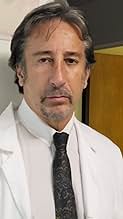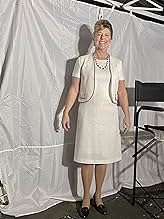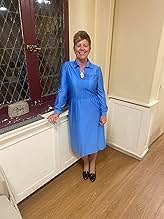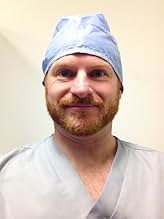1969. Dr. Audrey Evans joins world-renowned children's hospital and battles sexism, medical conventions, and the subterfuge of her peers to develop revolutionary treatments and purchase the ... Read all1969. Dr. Audrey Evans joins world-renowned children's hospital and battles sexism, medical conventions, and the subterfuge of her peers to develop revolutionary treatments and purchase the first Ronald McDonald House, impacting millions.1969. Dr. Audrey Evans joins world-renowned children's hospital and battles sexism, medical conventions, and the subterfuge of her peers to develop revolutionary treatments and purchase the first Ronald McDonald House, impacting millions.
- Awards
- 4 wins & 6 nominations total
- Director
- Writer
- All cast & crew
- Production, box office & more at IMDbPro
Featured reviews
This movie is worth the watch!
The life Dr. Audrey Evans is a story that needs to be told! What an amazing and inspirational woman - a true ground breaker for female doctors and well as women in science.
It's a powerful testimony to how far childhood cancer research & treatment has come. It also highlights the struggles families experience when they have a child with cancer.
It highlights the amazing work of the children's Hospital of Philadelphia (CHOP) and the Ronald McDonald House charities (RMHC.)
Dr. Audrey Evans was a true pioneer, who wasnt afraid to speak her mind and do what was right for her patients.
The life Dr. Audrey Evans is a story that needs to be told! What an amazing and inspirational woman - a true ground breaker for female doctors and well as women in science.
It's a powerful testimony to how far childhood cancer research & treatment has come. It also highlights the struggles families experience when they have a child with cancer.
It highlights the amazing work of the children's Hospital of Philadelphia (CHOP) and the Ronald McDonald House charities (RMHC.)
Dr. Audrey Evans was a true pioneer, who wasnt afraid to speak her mind and do what was right for her patients.
Absolute incredible production. This story is so heartwarming!! Finally a movie hits theaters that makes you feel, inspires you, makes you want to do good for the world and never give up. The cast absolutely crushed, Natalie was fantastic. Audrey is a hero and the perfect sort of leader. She is funny, kind, smart, brave, strategic and caring. A female that I will always look up to and admire to be like. This film is a must see. This should make waves through the medical industry and re-inspire and reinvigorate doctors around the world. I hope this movie makes an International push as everyone in the world should be privy to this inspiring story. Well done to everyone that touched this project.
I just listened to an interview that the writer of the film, Julia Fisher Farbman, gave and during the interview, she shared "if nothing else, I hope this story gives people hope". When I left the movie, I felt hopeful that in a scary world and in a world where pediatric cancer still exists and there is no cure YET, we can hold onto hope. We can can maintain the power of the word YET because we leave the film having hope. This movie shows to me how one person CAN make a difference in the world. I thought the entire cast and crew did a wonderful job. We need more movies like where the storytelling makes others want to do more to impact the world.
The subject of this film, Dr. Audrey Evans, a pediatric oncologist at the Children's Hospital of Philadelphia (CHOP), is nothing short of inspirational. It's quite realistic to think of her as Mother Teresa with an MD. Like Mother Teresa, Evans was devoutly religious and believed deeply that she was put on earth to care for children.
The story begins in 1969, when Dr. Evans has been recruited to CHOP after spending a few years at the University of Chicago. Overcoming innumerable obstacles, she and a couple of colleagues eventually developed a staging system for neuroblastoma, the most common pediatric cancer. As a result of Dr. Evans' work, treating children with neuroblastoma for the first time could be customized based on the patient's disease stage. Dr. Evans sense of humanity and her complete devotion to her patients make the title of the film entirely accurate.
"Audrey's Children" grew out of an interview in 2017 conducted by Julia Fisher Farbman (who wrote the script here) and Dr. Evans for the Amazon series "Modern Hero." Farbman was so impressed by her subject that she produced this film, raising all the funds from private sources. Because of the shoestring budget, the film had a shooting schedule of 23 days.
A key strength here is the film's accuracy and intense attention to detail. After the "Modern Hero" interview, Farbman spent many hours with Dr. Evans, who passed away in 2022 at age 97. The story is historically accurate and meticulously told. The Oncology Department at CHOP has publicly endorsed the medical accuracy of the story.
When filming, Director Ami Canaan Mann was equally attentive to detail. To ensure that the story was visually grounded in the time period, she used 35mm Ektachrome film. (HBO's "Euphoria" and the film "Poor Things" used the same cinematic technique.) As a result, the colors here are highly saturated and very high-contrast by today's standards. The production design (Amber Unkle), set design (Kimitha Cashin) and costumes (Sarah Maiorino) are equally faithful to the period (1969-1974).
What keeps the film from soaring is the script. There's no dramatic tension anywhere to be found. While there are occasional references to the misogyny Dr. Evans endured, there's nothing here that really gives the story any momentum. The film labors under the additional burden of its overarching theme: childhood cancer. Capturing vignettes of families who know their children are going to die (the mortality rate for childhood cancer in 1969 was 90%) involves some very heavy lifting. Efforts to generate a propulsive narrative are further weighed down by a script that necessarily involves a lot of medical terminology. When the central scenes involve debating which clinical features define the four stages of neuroblastoma, the creative team and the audience clearly have their work cut out for them. Before seeing this film, purchasing a copy of the latest edition of "Taber's Cyclopedic Medical Dictionary" might prove to be a good investment.
I wish I could be more supportive of this admirable attempt to lionize a modern-day saint. I also wish the creative team had channeled their energies, their work ethic and their good will into a first-rate documentary. As a drama, this film doesn't do her justice.
The story begins in 1969, when Dr. Evans has been recruited to CHOP after spending a few years at the University of Chicago. Overcoming innumerable obstacles, she and a couple of colleagues eventually developed a staging system for neuroblastoma, the most common pediatric cancer. As a result of Dr. Evans' work, treating children with neuroblastoma for the first time could be customized based on the patient's disease stage. Dr. Evans sense of humanity and her complete devotion to her patients make the title of the film entirely accurate.
"Audrey's Children" grew out of an interview in 2017 conducted by Julia Fisher Farbman (who wrote the script here) and Dr. Evans for the Amazon series "Modern Hero." Farbman was so impressed by her subject that she produced this film, raising all the funds from private sources. Because of the shoestring budget, the film had a shooting schedule of 23 days.
A key strength here is the film's accuracy and intense attention to detail. After the "Modern Hero" interview, Farbman spent many hours with Dr. Evans, who passed away in 2022 at age 97. The story is historically accurate and meticulously told. The Oncology Department at CHOP has publicly endorsed the medical accuracy of the story.
When filming, Director Ami Canaan Mann was equally attentive to detail. To ensure that the story was visually grounded in the time period, she used 35mm Ektachrome film. (HBO's "Euphoria" and the film "Poor Things" used the same cinematic technique.) As a result, the colors here are highly saturated and very high-contrast by today's standards. The production design (Amber Unkle), set design (Kimitha Cashin) and costumes (Sarah Maiorino) are equally faithful to the period (1969-1974).
What keeps the film from soaring is the script. There's no dramatic tension anywhere to be found. While there are occasional references to the misogyny Dr. Evans endured, there's nothing here that really gives the story any momentum. The film labors under the additional burden of its overarching theme: childhood cancer. Capturing vignettes of families who know their children are going to die (the mortality rate for childhood cancer in 1969 was 90%) involves some very heavy lifting. Efforts to generate a propulsive narrative are further weighed down by a script that necessarily involves a lot of medical terminology. When the central scenes involve debating which clinical features define the four stages of neuroblastoma, the creative team and the audience clearly have their work cut out for them. Before seeing this film, purchasing a copy of the latest edition of "Taber's Cyclopedic Medical Dictionary" might prove to be a good investment.
I wish I could be more supportive of this admirable attempt to lionize a modern-day saint. I also wish the creative team had channeled their energies, their work ethic and their good will into a first-rate documentary. As a drama, this film doesn't do her justice.
I felt that the film was very well balanced. It showed the complexity's of being a woman in a male dominated environment. Her compassion for the children and their parents was self evident. I also liked how easily she could subvert or coerce people to her side. The opening scene of the movie tell you everything you really need to know about her personality. Her tenacity is a blessing and a curse. At times, she doesn't know when to take her foot off the gas pedal and apply the brakes. My only complaint is that I would love to have seen a little bit more of her personal life during this Period. As a Philadelphian I'm a Lil was ashamed that I didn't know anythingabout her.
Did you know
- TriviaFilmed in 23 days.
- GoofsSeveral scenes take place on the roof of the hospital with Philadelphia City Hall nearly next door. The Children's Hospital of Philadelphia from 1916 to 1974 was at 18th & Bambridge which is many blocks away with City Hall not even being visible from the hospital roof.
- How long is Audrey's Children?Powered by Alexa
Details
- Runtime
- 1h 50m(110 min)
- Color
Contribute to this page
Suggest an edit or add missing content










































